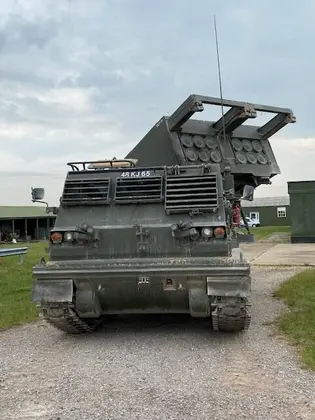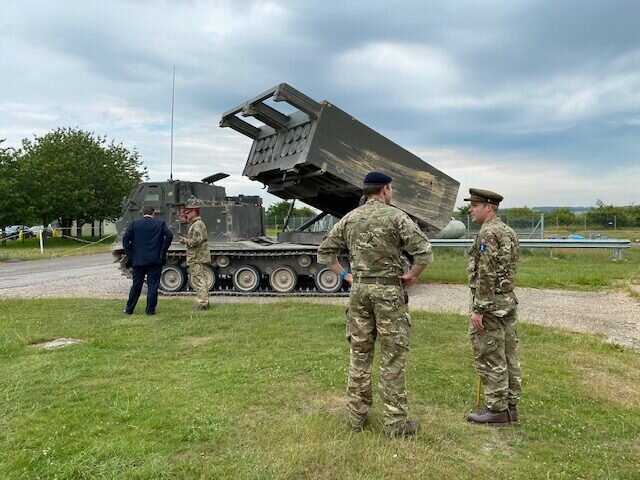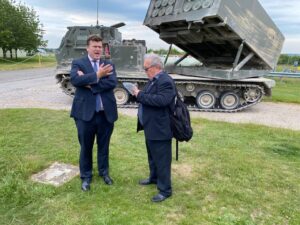British Prime Minister Boris Johnson is living up to his promise of training up Ukrainian soldiers in the use of much-needed and game-changing heavy weaponry. On Thursday, June 23, London-based Kyiv Post reporter Tony Leliw was given rare access to an army camp deep in the British countryside, where Ukrainian soldiers were being put on a three-week programme on how to use Multiple Launch Rocket Systems (MLRS) and L119 Light Guns. Not only did he get a chance to talk to the UK Minister for the Armed Forces James Heappey, who was present on a morale-boosting visit, but to see the Ukrainian soldiers being put through their paces.
Unlike a visit to a normal military exercise where everybody is in good spirits, learning a skill that they may or may not use in their career, the British Minister for the Armed Forces James Heappey said the mood at the training camp was different.
JOIN US ON TELEGRAM
Follow our coverage of the war on the @Kyivpost_official.
“The focus was knowing that everything you are learning right now, you need to learn it well, because the next time you will do this will be for real, and you are facing mortal danger,” he said.
“There is no laughing and joking, no people not paying attention at the back, they are laser-liked focused on learning the skills they need to take these weapons systems back to Ukraine and fight for their freedom. That is pretty striking and amazing to see.”
Speaking to Ukrainian soldiers with the aid of interpreters, Heappey was keen to discover how they were doing, and got a positive response. They told him that although they liked being here in the UK, they were very keen to get back to Ukraine to put their training into practice.
A group of Ukrainian soldiers showed Heappey the workings of a pointing system. This is a piece of military kit which helps a soldier find the correct direction they need to fire their big guns. They then moved on to the L119 Light Guns, a towed field gun used in past conflicts such as the Falklands War and Sierra Leone. It has a firing range of up to 11,400 metres (12,500 yards).
I approached a soldier from the northern Ukrainian town of Zhytomyr, who did not want to be identified. He had been at the camp for four days, and I asked him how the training was going. “We are very experienced in artillery so the training is not hard,” he said.
A sergeant from the Western city of Rivne, who was stationed in Kyiv Region, said he was called into action shortly after Putin’s full-scale invasion began. He said he was looking forward to the training, adding: “Where they will send us when we return no-one knows.”
A volunteer soldier from Dnipropetrovsk said his family were extremely worried about him. His previous job was in show business. “I was a tour manager for Ukrainian pop groups,” he said. “We will win because we are getting better training and heavy weapons.”
When I spotted an insignia on another soldier’s arm and wanted to know what regiment or battalion he was from, his senior officer vented his opinion that he should be careful what he told me, so I stepped away.
Giving too much information to the enemy was not my intention, but being a Ukrainian speaker as opposed to other journalists who didn’t know the language, the temptation to get a closer understanding than those relying on interpreters was there.
I took many photos of our brave soldiers – both men and women – but the British Ministry of Defence, urged me not to use them in the interests of the safety of the soldiers, and I respected that decision.
An English teacher from Khmelnytsky said she was not content to be just a refugee, but wanted to be useful, so she had enlisted to work for the British Army as an interpreter. She said: “I am helping to pass on instructions to our soldiers on how to operate the guns. They are very smart, they understand they have a short period of time for this training.
“They are very observant and are asking lots of questions. There are more than 20 interpreters in different locations. Rollestone Camp in Salisbury is not the only place where they are being trained.”
Heappey said his own experiences of warfare in Afghanistan and Iraq, facing suicide bombers, was nothing in comparison to Ukrainians fighting on the frontline in Ukraine.
I asked Heappey what impact the MLRS, capable of delivering a 200 lb high explosive warhead over 70km with pinpoint accuracy, would have on the war. “Giving MLRS to Ukraine was sending a powerful message to Vladimir Putin and Sergei Lavrov,” he said. “They will tell you it is a provocation, an escalation. It is not.
“What it is is a weapons system that is very necessary against a Russian army that fights a quite intense artillery battle, and if you are outranged, frankly you are not in the fight.
“The Ukrainians have been saying they need precision, long-range artillery. They know that we, the Americans and others have MLRS. The UK has led the way, and we will see a really decisive difference when it gets there.
“All that is needed is for these systems to be deployed and used in such a way that it will arrest the Russian advance, turns the Russians and starts to push them back out of Ukraine.
“And then it is down to Russia as to whether it wants to stay indefinitely, fighting year after year in a war they are steadily losing, or whether they say ‘enough is enough and time to go home’.
“I hope that it is the latter because I want Ukraine to return to being a peaceful country, living within its borders, free from the aggression from its neighbours.
“But really the decision is from Vladimir Putin. We and the international community will continue to make sure that Ukraine gets what it needs for as long as Ukraine needs to fight on.”
The question of whether giving too much weapons to Ukraine might leave Britain exposed came up.
Heappey said: “We know the amount of stuff we are willing to send to Ukraine, and we recognise they are in the fight right now.
He went on: “We understand the level below which we will not go with our stockpiles, because of our responsibility to defend UK. But Ukraine is a great ally, and we have been willing to push that, and I am very proud that we have done so.”
Our soldiers were in good spirits – eager to learn how to defeat their enemy. I wished them well at the end of my visit.
“Let’s hope we can meet in Kyiv next year victorious, and drink champagne,” I said. They raised their invisible glasses and toasted in response. As I got into my car and drove off, I prayed to God that I would be right.
You can also highlight the text and press Ctrl + Enter





